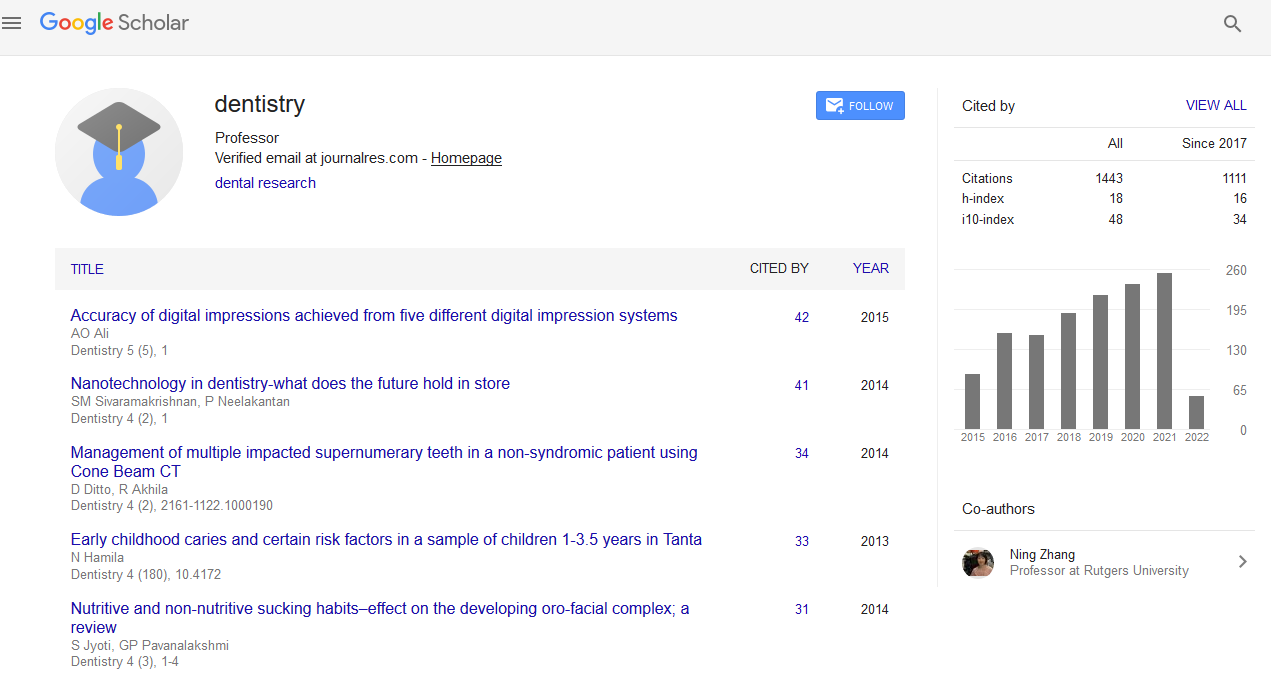Citations : 1817
Dentistry received 1817 citations as per Google Scholar report
Indexed In
- Genamics JournalSeek
- JournalTOCs
- CiteFactor
- Ulrich's Periodicals Directory
- RefSeek
- Hamdard University
- EBSCO A-Z
- Directory of Abstract Indexing for Journals
- OCLC- WorldCat
- Publons
- Geneva Foundation for Medical Education and Research
- Euro Pub
- Google Scholar
Useful Links
Share This Page
Journal Flyer

Open Access Journals
- Agri and Aquaculture
- Biochemistry
- Bioinformatics & Systems Biology
- Business & Management
- Chemistry
- Clinical Sciences
- Engineering
- Food & Nutrition
- General Science
- Genetics & Molecular Biology
- Immunology & Microbiology
- Medical Sciences
- Neuroscience & Psychology
- Nursing & Health Care
- Pharmaceutical Sciences
Abstract
Mucosal Substitutes for Periodontal Soft Tissue Regeneration
Swati Gupta, Pratibha PK and Richa Gupta
Periodontal plastic surgery would be defined as the surgical procedures performed to prevent or correct anatomic, developmental, and traumatic or disease induced defects of the gingiva, alveolar mucosa or bone. The introduction of oral mucosal equivalents also called as mucosal substitutes or mucosal fillers, composed of the structured triad of scaffold, cells and signaling molecules could be considered the essence or a culmination of the notion of periodontal regeneration. For the purpose of soft tissue augmentation, various mucogingival surgical procedures that are usually performed are: connective tissue grafts (gold standard) and its modifications, lateral pedicle flap, free gingival grafts, semilunar flaps, coronally positioned flaps. Several mucosal substitutes have been fabricated and tried with varying results. Tissue engineered mucosal constructs owe their origin to the treatment of ulcers, diabetic foot and burns. There is an increasing interest in the field of dentistry too. Mucosal substitutes are made of cell sources that have not caused acute and chronic tissue reaction and have self-renewal properties that can re-grow and differentiate to a new tissue. With all the advantages of reproducible tissue engineering technologies, these mucosal substitutes/ oral mucosal equivalents appear to be the imminent hope for tissue repair, replacement or regeneration in regenerative medicine in the treatment of lost tissues, impaired functions and soft tissue defects that are caused by congenital abnormalities, trauma, diseases or aging processes.


